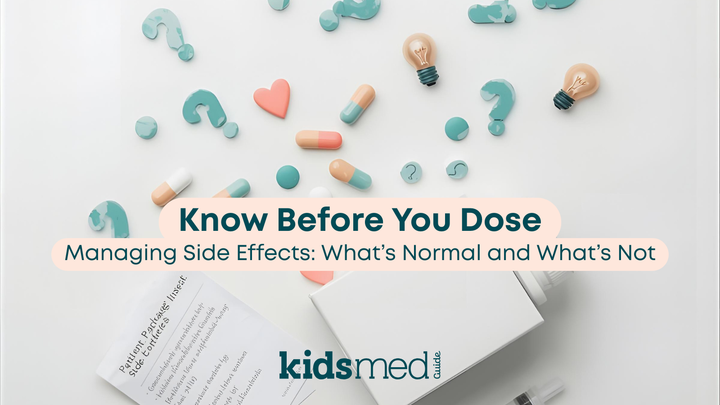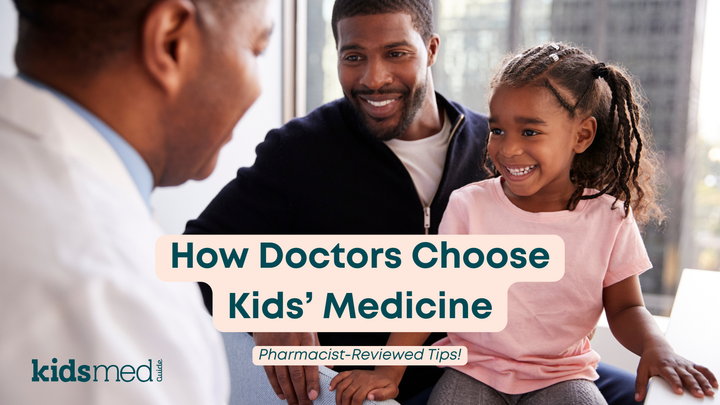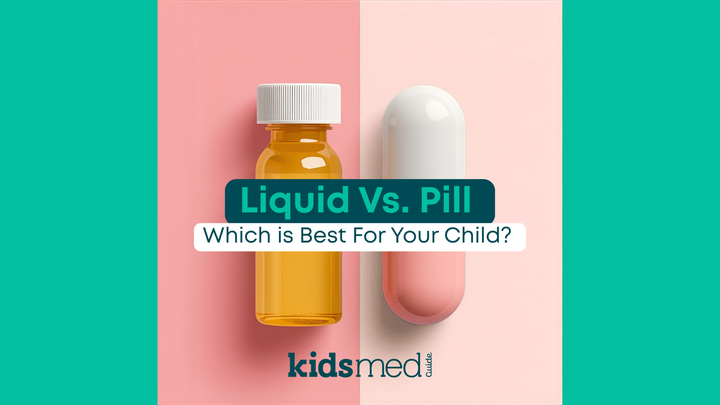How Long Until a Medicine Should Start Working?
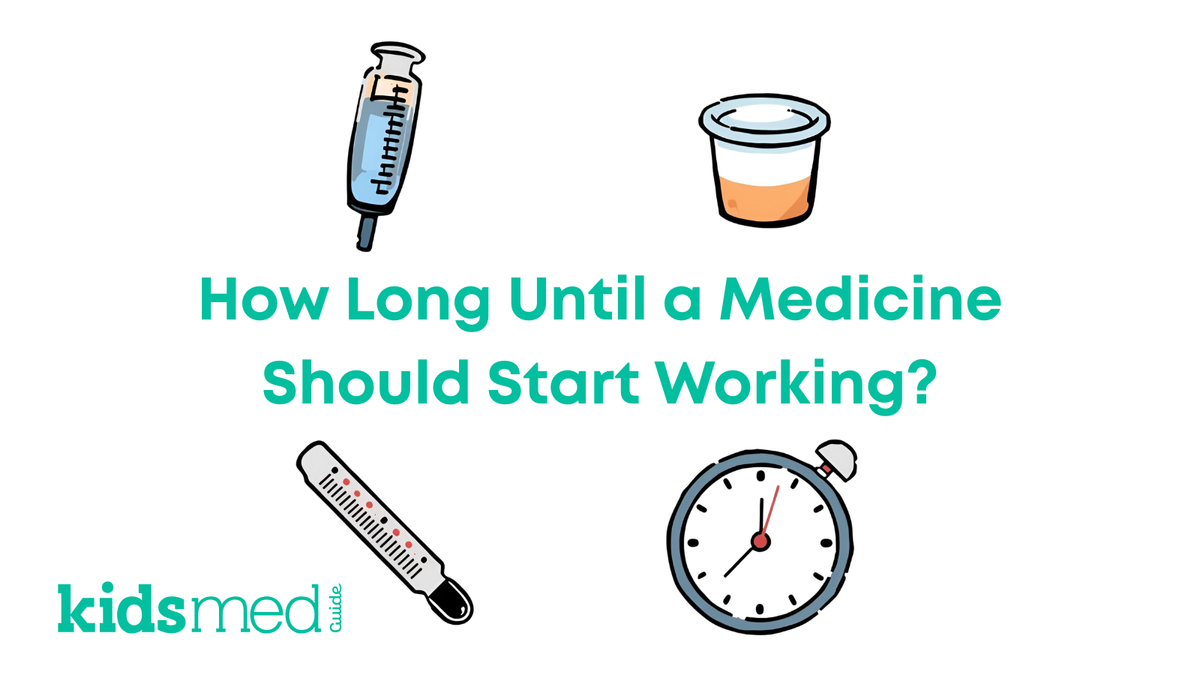
If you’ve ever given your child a dose of medicine and immediately started the countdown as if it’s rocket launch time, you’re not alone. I’ve done it too—when my toddler is cranky with an ear infection and I squirt amoxicillin in their mouth, then stare at the clock, waiting for the misery to end!
Giving your child medicine is never fun, and parents may wonder how long it takes for the medicine to work. There is no one-size-fits-all answer. Each medication has its own timeline. How quickly it works depends on the type of drug, how it’s given, the intended effect, and how your child’s body processes it.
In this blog, we’ll cover some basic medication information and discuss common pediatric medications to help you understand what to expect and when to follow up if something doesn’t seem right.
Why Understanding Medication Onset Is Important
Knowing how long it takes for medication to work helps you set realistic expectations and avoid unnecessary worry. Some medicines, like fever reducers or inhalers, start working quickly. Others, such as antibiotics or allergy medication, require more time before showing results.
If you expect quick results from a slow-acting medication, it can be frustrating and may lead you to think it isn’t working. On the other hand, understanding when a medicine should start working can help you recognize potential issues, such as a missed dose, an ineffective treatment, or a resistant infection.
Factors That Affect How Quickly Medicine Works
Several factors influence how quickly medicine starts working in children. The absorption, distribution, metabolism, and desired effects of drugs can vary between different medications and individuals. The drug formulation and design also play an important role.
Type of medication
Fast-acting medicines, like acetaminophen or albuterol, usually start working within 20 to 60 minutes. Medications that target the root cause of an illness, such as antibiotics or long-term asthma controllers, take more time to show their effects or modify the disease.
One way to think about it is that symptom-relief medicines often work quickly because they target what’s happening right now, while medicines that aim to treat or change the root cause of an illness or disease need to address the underlying issue first before noticeable improvement occurs.
Dosage and form
Liquids are absorbed faster than tablets because they don’t need to dissolve first. Chewables, dissolvable tablets and films, inhalers, and injections often work quickly since the medicine enters the bloodstream or lungs immediately.
Topical products for skin issues, such as steroid cream for itching, can work quickly because they are applied directly to the affected area.
Extended-release or long-acting dosage forms are designed to work slowly, delivering consistent results over days, weeks, or months, instead of immediately.
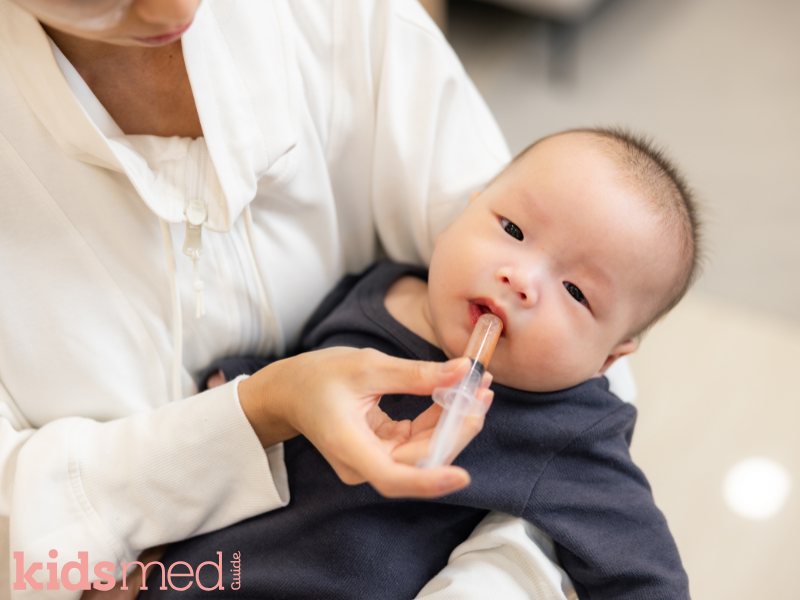
Age and metabolism of the patient
Children’s metabolisms differ from those of adults and change during childhood. Younger children may metabolize some medications faster than adults, while others may take longer, depending on how the drug is processed and the child's developmental stage.
How the drug is distributed
Once a medication enters the bloodstream (or is absorbed through the skin, lungs, etc.), it can take time for the medication to reach its target site and exert its effects. This time depends on many factors, including body composition, drug formulation, dose, and the patient's age, among others. Some drugs (like acetaminophen) exert their peak effects when the drug concentration is at its highest point at the site of action.
Other drugs, such as medications for anxiety or seizure control, may take a few days or weeks to reach a steady state and start working, but their effect remains consistent and isn’t dependent on the distribution and peak concentration of each dose.
Underlying health conditions
Children with liver, kidney, or gastrointestinal conditions may absorb or eliminate drugs differently. Even mild dehydration or whether a medicine is taken with food can affect how long it takes for a medication to work.
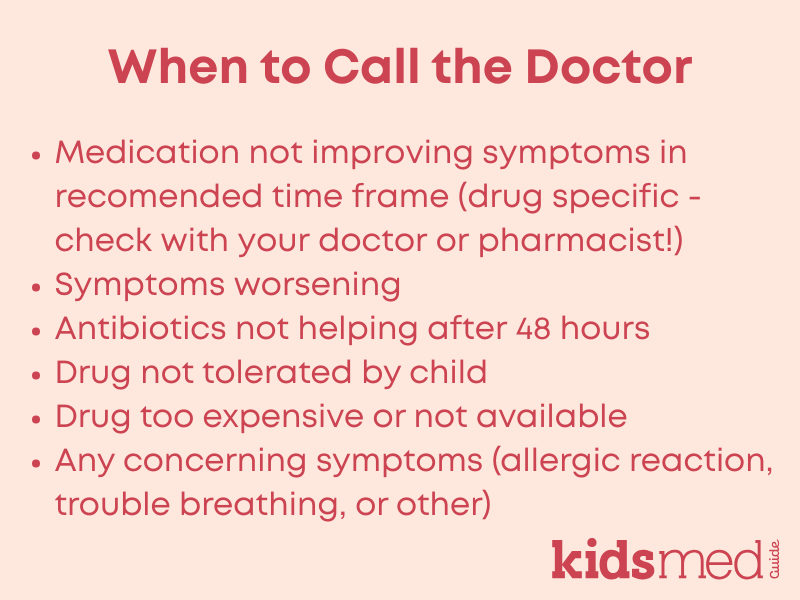
Common Medications and Their Onset Times
Pain relievers and fever reducers
Acetaminophen and ibuprofen usually start working within 30 to 60 minutes, with the peak effect typically around one hour. If the fever doesn’t decrease immediately, be patient and verify that you used the correct weight-based dose.
Antibiotics and how long they take to work
Parents often ask how quickly antibiotics work. Children usually start feeling better within 24 to 48 hours of beginning treatment. If your child worsens or shows no improvement after 48 hours, contact your pediatrician for advice.
Early improvement is great for sick kids! But feeling better within a day doesn’t mean the infection has disappeared. Completing the full course of antibiotics is crucial. Usually, it takes time and multiple doses to fully eliminate an infection.
Taking antibiotics exactly as prescribed helps prevent the infection from returning and reduces the risk of resistant bacteria developing.
Cold, allergy, and cough remedies
Oral antihistamines, such as cetirizine or loratadine, may take anywhere from 20-30 minutes to a few hours to help relieve allergy symptoms. This usually provides quick relief, but for seasonal allergies, antihistamines should be taken daily throughout allergy season for the best results. Nasal sprays may require several days of regular use to achieve full relief.
Cough medicines vary a lot, and many don't work well. For viral coughs, supportive care—such as using a humidifier, staying hydrated, and giving honey (for children over one year)—is often more helpful than medication.
Chronic condition medications
Asthma controllers, ADHD medications, insulin, and other long-term drugs each have different timelines. Inhaled corticosteroids for asthma may need a week or two of consistent use to become effective. ADHD stimulants typically work within an hour, while non-stimulants can take several weeks.
Medications for chronic conditions can take varying amounts of time for parents to see the intended benefits or results. Since this can differ a lot, it's best to talk with your pediatrician about what to expect.
Tips to Help Medicine Work Effectively
Regardless of the medication, there are some steps you can take to ensure your child's medication therapy is as effective as possible:
- Give doses exactly as prescribed and on schedule.
- Follow instructions about taking medication with or without food or at a specific time of day.
- Shake liquid medicines before each dose if the label indicates it.
- Use the proper measuring device, not a kitchen spoon.
- Store medicines safely, away from humidity and heat.
- Keep a medication log to prevent missed or double doses and to monitor symptoms or benefits.
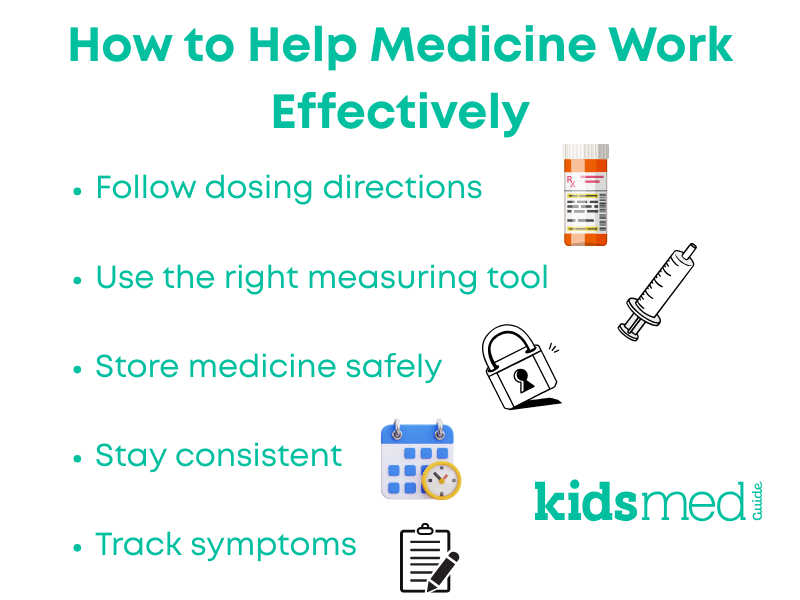
What to Do if a Medicine Isn’t Working
If symptoms aren’t improving within the expected timeframe, review the basics. Were all doses given? Was it stored correctly? Is it expired? If everything checks out and your child still isn’t getting better or is getting worse, contact your pediatrician or pharmacist.
Never double up on doses or stop medication early without consulting a healthcare professional.
Preparing Children and Families for Medication Management
Helping kids understand why they take medication makes things easier for everyone. Use simple, age-appropriate explanations like “This helps your body fight germs” or “It helps your lungs take big breaths.”
Establishing a routine also helps. Giving medication at the same time each day creates consistency, especially for chronic conditions. If doses are needed at school, coordinate with the nurse or teacher to ensure everything runs smoothly.
Monitoring and Tracking Effectiveness
Tracking your child’s response helps your healthcare provider decide what’s working and what isn’t.
- Keep a medication/symptom log or note patterns in behavior or comfort.
- Use medication reminder apps.
- Record any side effects or changes in sleep, appetite, or mood.
Conclusion
Knowing how long it takes for medication to work can help you avoid unnecessary worry and alert you if a medication isn’t effective. The time it takes to reach peak effectiveness varies for each drug, so consult with your doctor or pharmacist!
Frequently Asked Questions
How long does it take for medicine to start working?
It depends on the medication. Pain relievers might work within an hour, while antibiotics or allergy medicines could take one to several days.
Why do some medicines take longer to work than others?
Different drugs target different parts of the body. Some relieve symptoms immediately, while others address the root cause and take longer to work. How a drug is absorbed, distributed, and metabolized is also important, as is the dosage form.
Can children respond differently to the same medicine?
Yes. Age, weight, metabolism, other drugs, and health conditions can all influence how quickly a medicine works for each child.
What should I do if antibiotics don’t seem to work?
If your child isn’t improving after 48 hours, contact your pediatrician. Don’t stop or change antibiotics without consulting a healthcare professional.
How can I track if a medicine is working effectively?
Keep a log of doses, symptoms, and side effects. Apps or notes on your phone make it easy to share updates with your child’s doctor.
The following references were used to compile this information:
CDC. (2025, September 16). Antibiotic Prescribing and Use. Antibiotic Prescribing and Use. https://www.cdc.gov/antibiotic-use/index.html
Institute of Medicine (US) Roundtable on Research and Development of Drugs, B., & Yaffe, S. (2000). Pharmacokinetics and Pharmacodynamics in Children versus Adults. In Rational Therapeutics for Infants and Children: Workshop Summary. National Academies Press (US). https://www.ncbi.nlm.nih.gov/books/NBK225507/
Lexicomp Pediatric & Neonatal Dosage Handbook. 30th ed. Hudson, OH: Wolters Kluwer Health; 2024.
Using Over-the-Counter Medicines With Your Child. (2021, October 20). HealthyChildren.Org. https://www.healthychildren.org/English/safety-prevention/at-home/medication-safety/Pages/Using-Over-the-Counter-Medicines-With-Your-Child.aspx?utm_source=chatgpt.com

